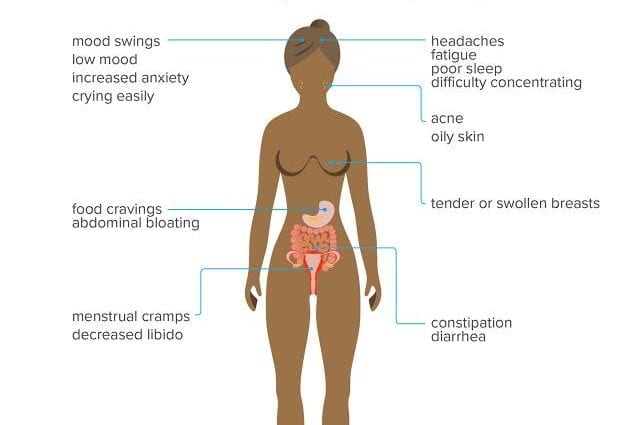PMS (premenstrual syndrome) is one of the mysterious conditions of a woman. Scientists believe that this is a mixture of more than 150 different symptoms, physical and psychological. The main signs of PMS are the following changes: depression, irritability, mood swings, soreness, swelling of the chest, forgetfulness, fatigue, headache, and the like.
Premenstrual syndrome was known long before our time, this problem was faced by Hippocrates. 2,500 years ago, he discovered similar symptoms in women in ancient Greece. As mentioned above, PMS manifests itself in different ways. It was based on the symptoms that 3 types of premenstrual syndrome were identified.
1. Psycho-emotional PMS: worry about fatigue, irritability, apathy, tearfulness.
2. Vegetative-vascular PMS, in which there is a headache, vomiting and nausea, possible discomfort in the heart.
3. Endocrine PMS, it occurs as a result of a violation of metabolic processes in the body. At the same time, there is a general malaise, swelling, breast swelling, and an acute sense of smell.
According to experts, approximately 40% of women of different ages suffer from PMS to some extent. Usually, the symptoms of premenstrual syndrome in women appear a few days before menstruation. Some begin to suffer in three days, and some-as much as 2 weeks. Researchers estimate that about 15% of women experience significant problems in life from PMS. In this part of women, the characteristic symptoms of premenstrual syndrome are so strong that they can disrupt relationships with others, lead to disability, and so on. That is why we do not recommend that you let everything take its course if you notice similar symptoms in yourself. How to stay in a good mood during this period, you may ask? We have the answers!
Here are the recommendations that will help you relieve or eliminate the symptoms of PMS altogether.
1. Take more walks in the fresh air. During the period of PMS, exercise will help to ease the disturbing symptoms. Walking, running, and swimming promote the formation of endorphins (chemicals in our brain), which are responsible for good mood. Physical activity increases blood flow to the genitals and may well prevent cramping pains or similar symptoms of PMS. That is, in order to feel good during this period, increase the number and duration of your walks (before the critical days, you need to walk every day for 40 minutes for a week).
2. Don’t let your bad mood and fatigue get the better of you. Play sports, listen to pleasant, slow, soothing music, use aromatic oils, take a warm bath, in short, try to tune in to the positive.
3. Sleep at night. If you know firsthand what PMS is, you need to sleep at night. At the same time, try to go to bed and get up at the same time. Any violations of the daily rhythms, according to experts, affect the menstrual cycle, exacerbate irritability and fatigue. At night, the hormone content drops, therefore, it is at this time to sleep better.
4. Consume vitamins. Consult your doctor to determine the vitamin complex your body needs. You can find special vitamins in pharmacies that help in eliminating the symptoms of PMS, but they can be consumed only after consulting a doctor.
5. No fatty foods. According to experts, a lot of fatty foods cause biochemical changes in the body, exacerbating the symptoms of PMS. It is better to eat pasta, vegetables, fruits. These foods contain an abundance of complex carbohydrates, which are the main source of mood-enhancing chemicals in the human brain.
6. Consume less caffeine. Coffee, cola, chocolate, and similar products that contain caffeine can cause such phenomena in the body, anxiety, as chest pain, anxiety, and other symptoms of PMS.
7. Do not drink alcohol. Some people sometimes drink wine, beer, and other alcoholic beverages to relieve PMS. But the relief is only apparent, at best temporary.
The knowledge that premenstrual syndrome is not permanent contributes to a slight, but still relief. Behind the joyful and not so happy events, everyday affairs, the time will come when your body will enter the menopause phase. And once menstruation passes, there will be no reason for the appearance of symptoms of this mysterious and unpleasant syndrome.
Remember: your health and mood are in your hands!










